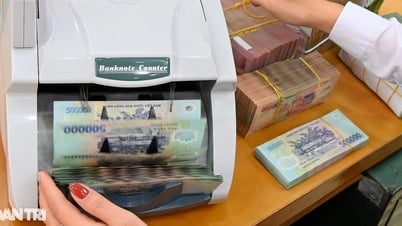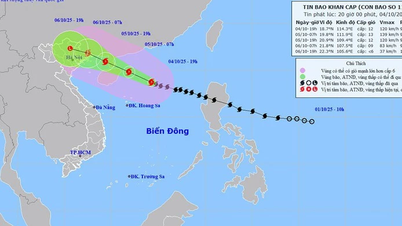ANTD.VN - From now on, all personal identification codes will be used as tax codes. The General Department of Taxation said this will not only facilitate state management agencies, but also minimize inconvenience to the people.
According to Clause 7, Article 35 of the Law on Tax Administration: "When personal identification numbers are issued to the entire population, personal identification numbers shall be used instead of tax codes."
Thus, in the near future, when our country completes the issuance of identification codes to all citizens, citizens can use identification codes to replace personal tax codes when carrying out procedures related to opening bank accounts, declaring taxes, paying taxes, and registering for electronic transactions.
According to Mr. Mai Son, Deputy General Director of the General Department of Taxation, to use personal identification numbers instead of tax codes, the General Department of Taxation has performed a query of taxpayer information in the tax industry database with the national population database to collect information on personal identification numbers corresponding to the tax codes being monitored in the tax industry database.
Regarding concerns that this conversion will cause inconvenience to people, according to the General Department of Taxation, this not only creates convenience for state management agencies but also aims to minimize inconvenience to people.
 |
From now on, all current tax codes will be replaced by personal identification codes. |
Mr. Mai Son said that the tax authority will not require taxpayers to change their tax code information because it has deployed solutions to connect with the national population database to collect information on personal identification numbers of corresponding tax codes.
Only in cases where the query with the national population database cannot find the citizen identification code, the tax authority shall propagate and guide taxpayers to declare and change tax registration information to collect information on the taxpayer's personal identification code.
For dependents when declaring personal income tax settlement or registering for family deductions, taxpayers declare personal identification code/citizen identification number of dependents, then the tax authority will update the information into the tax industry database.
To change tax registration information and update personal identification code/citizen identification number information into the tax industry database, the tax authority has deployed many electronic solutions to support taxpayers to declare conveniently and quickly via the General Department of Taxation's Electronic Information Portal, the National Public Service Portal or the eTax Mobile application.
Using personal identification codes as tax codes will also minimize inconvenience for people. Currently, individuals have many types of documents to remember such as: citizen identification number, tax code, social insurance number, health insurance card number... Therefore, every time individuals have to declare information to state management agencies, it is very troublesome because they cannot remember all types of personal information.
On the part of state agencies, due to independent management according to different codes, when there is a need to exchange information about citizens, it is necessary to base on a set of information fields of an individual (such as full name, date of birth, identity card number) to determine that the information is of the same individual, which takes a lot of time and effort.
When using the unified citizen identification number as a tax code as well as to resolve administrative procedures with other state agencies, people only need to declare their identification number information.
In terms of state management, the personal identification number is a code that allows agencies to exchange personal information to serve management by sector or field for citizens. For example, tax authorities need to exchange information with social insurance to strengthen personal income tax management; exchange information with land management authorities to strengthen management of land revenues, etc.
Source link


![[Photo] General Secretary To Lam attends the 8th Congress of the Central Public Security Party Committee](https://vphoto.vietnam.vn/thumb/1200x675/vietnam/resource/IMAGE/2025/10/4/79fadf490f674dc483794f2d955f6045)
![[Photo] Solemn opening of the 8th Congress of the Central Public Security Party Committee, term 2025-2030](https://vphoto.vietnam.vn/thumb/1200x675/vietnam/resource/IMAGE/2025/10/4/f3b00fb779f44979809441a4dac5c7df)
![[Photo] Bustling Mid-Autumn Festival at the Museum of Ethnology](https://vphoto.vietnam.vn/thumb/1200x675/vietnam/resource/IMAGE/2025/10/4/da8d5927734d4ca58e3eced14bc435a3)

























































![[VIDEO] Summary of Petrovietnam's 50th Anniversary Ceremony](https://vphoto.vietnam.vn/thumb/402x226/vietnam/resource/IMAGE/2025/10/4/abe133bdb8114793a16d4fe3e5bd0f12)

![[VIDEO] GENERAL SECRETARY TO LAM AWARDS PETROVIETNAM 8 GOLDEN WORDS: "PIONEER - EXCELLENT - SUSTAINABLE - GLOBAL"](https://vphoto.vietnam.vn/thumb/402x226/vietnam/resource/IMAGE/2025/7/23/c2fdb48863e846cfa9fb8e6ea9cf44e7)

































Comment (0)